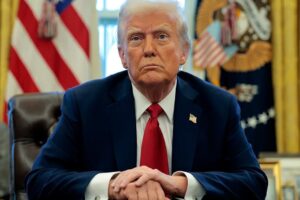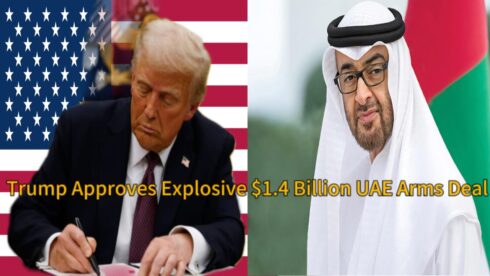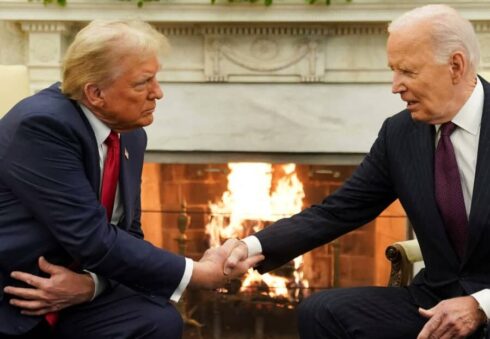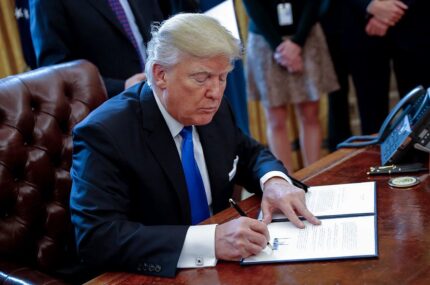US. President Donald Trump, in his renewed 2025 administration, has approved a controversial $1.4 billion arms deal with the United Arab Emirates, drawing global scrutiny and reigniting debates over Washington’s military entanglements in the Middle East. The arms package—reportedly including precision-guided munitions, surveillance drones, and advanced missile systems—was fast-tracked under Trump’s revised foreign policy agenda emphasizing “Peace Through Strength.”
U.S. defense officials argue the deal reinforces the strategic partnership between Washington and Abu Dhabi, especially as Iran ramps up military operations across the Strait of Hormuz. Trump allies tout the move as a bold counterweight to “radical Islamic regimes,” though critics fear it will escalate military tensions and further destabilize the fragile balance of power in the Persian Gulf.
U.S. Arms Deal Threatens to Reshape Gulf Military Landscape
U.S. analysts warn that the Trump-approved weapons package could significantly shift military dynamics in the Middle East, especially given the UAE’s growing military assertiveness in Libya, Sudan, and Yemen. The inclusion of long-range guided missiles, high-altitude surveillance drones, and counter-drone systems suggests an aggressive enhancement of the UAE’s strike and defensive capabilities.
U.S. intelligence briefings indicate that Iran is likely to view the deal as a direct provocation, potentially prompting retaliatory moves, cyberattacks, or escalated proxy warfare. Experts argue this decision could trigger a fresh arms race, forcing regional powers like Qatar and Saudi Arabia to pursue their own military build-ups—often through American-made weapons as well.
U.S. Human Rights Groups Slam Trump’s UAE Deal as ‘Morally Bankrupt’
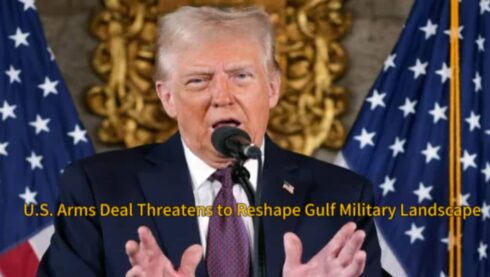
U.S.-based human rights groups, including the American Civil Liberties Union (ACLU) and Human Rights First, have condemned the 2025 Trump administration’s decision, calling it a betrayal of global humanitarian values. They cite documented UAE-led airstrikes in Yemen and civilian casualties linked to earlier U.S. weapons as evidence of why further arms transfers are “dangerous and irresponsible.”
U.S. watchdogs argue the arms deal violates international humanitarian laws and calls into question America’s commitment to global accountability. Several advocacy coalitions are calling for immediate congressional review and urging the United Nations to investigate the deal’s potential to contribute to war crimes or civilian harm.
U.S. Defense Contractors Reap Massive Profits From Trump-Backed Arms Package
U.S. defense corporations such as Raytheon, Lockheed Martin, and General Atomics are set to benefit massively from the UAE arms package, with estimated production contracts generating billions in future revenues. Stocks surged on Wall Street following Trump’s public endorsement of the deal, as his administration continues to prioritize military exports as a central pillar of economic growth.
U.S. economic strategists note that Trump’s “America First” defense doctrine aggressively ties foreign policy to industrial output, especially in swing states with heavy defense manufacturing like Texas, Arizona, and Michigan. However, critics caution that the profit-driven arms race encourages global instability and entrenches the influence of the military-industrial complex in American politics.
U.S. Lawmakers Divided as Congressional Backlash Mounts
U.S. Congress is now sharply divided over the Trump-approved UAE arms deal, with key Democrats and even some libertarian-leaning Republicans calling for investigations and potential legislative blocks. Senators like Chris Murphy and Rand Paul have voiced strong opposition, citing risks to global security and American complicity in foreign conflicts.
U.S. House Foreign Affairs Committee leaders have announced emergency hearings to assess whether the deal adheres to the Arms Export Control Act. While Trump loyalists in Congress argue the sale is necessary for counterterrorism, opposition lawmakers are pushing for stringent oversight, human rights clauses, and a pause on future weapons transfers to Gulf monarchies.
U.S. Reputation at Risk as Trump’s UAE Deal Triggers Diplomatic Fallout
U.S. diplomatic partners in Europe, including Germany and France, have quietly expressed concerns over the Trump administration’s unilateral move to arm the UAE without broader NATO consultation. The arms deal threatens to undermine diplomatic efforts toward de-escalation in Yemen and Gaza, while casting doubt on America’s role as a neutral peacebroker.
U.S. State Department insiders fear the deal could damage President Trump’s standing at the upcoming United Nations Security Council summit, where U.S. leadership on human rights and disarmament is already under pressure. The UAE arms package is rapidly becoming a geopolitical flashpoint—casting long shadows over America’s strategic integrity and international alliances.






